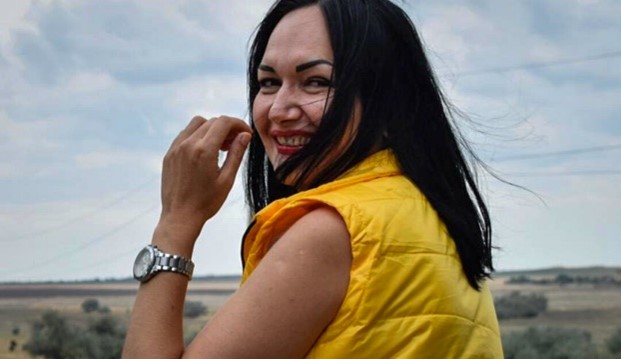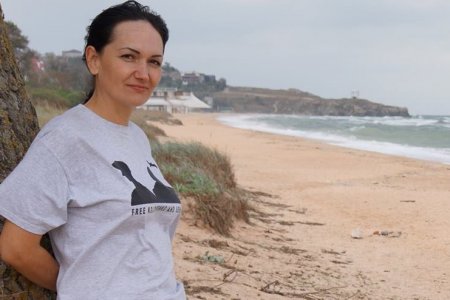
The ‘trial’ is underway in Russian-occupied Crimea of Iryna Danilovych, the Ukrainian nurse, human rights defender and civic journalist who disappeared for almost 13 days after being taken prisoner by Russian enforcement officers on 29 April 2022. The circumstances around this effective abduction, as well as many other details about the case, make it near certain that the charges are fabricated and that Danilovych is imprisoned for her civic activism and journalism.
Danilovych herself is adamant that she was only charged with possession of an explosive a full week after her seizure and after numerous interrogations regarding supposed contacts with foreign organizations. The FSB were hoping to accuse her of ‘state treason’ and when they failed to force a ‘confession’ or ‘evidence’ out of the young woman, they claimed to have found the explosive in her glasses case. It was only then, on 7 May, that she was officially detained, although she had been held in the basement of the Russian FSB offices for a full week at that stage. It was a further five days before her lawyer, Aider Azamatov, received confirmation that she was imprisoned in the Simferopol SIZO [remand prison].
Iryna Danilovych is a trained nurse who was also active as a civic journalist, writing on problems to do with the health service in occupied Crimea; on human rights violations for the civic initiative Crimean Process; and for various independent publications. Any active defence of human rights is likely to antagonize the occupation regime, and Danilovych also worked as head of the Crimean branch of the Alliance of Doctors, a Russian (and Crimean) trade union. She had been involved in attempts to obtain the supplementary payments promised to medical workers at the beginning of the pandemic and to highlight the lies told about the number of casualties, etc. She told Crimean Realities, for example, that the situation with covid was much worse than the official statistics admitted. She had also expressed opposition to Russia’s full-scale invasion of Ukraine.
Human rights defender and Graty correspondent Lutfiye Zudiyeva has reported on the first two hearings in the ‘trial’ underway at the occupation Feodosia municipal ‘court’ under ‘judge’ Natalia Kulinskaya. If the latter hands down the conviction and sentence demanded, this will not be for want of information about the gross irregularities in the case. Danilovych herself stated, during the first hearing, that she had not been detained on 29 April, but abducted. She explained that she had been put in the temporary holding centre during the night from 6 to 7 May, at 4 a.m.. She had been taken from there to the ‘court’, and then later moved to the SIZO. “From 29 April, I was in the basement of the FSB building against my will.” Kulinskaya did draw attention to this and got Danilovych to confirm her “assertion” that the detention protocol was only drawn up on 7 May at 2.55.
It should be stressed that there is ample evidence that the civic journalist was seized a week before this is officially admitted, and that the grounds given for the search of the home she shares with her parents had nothing to do with the charges which form the supposed justification for her arrest.
It only became clear when Danilovych was already in SIZO, that she was being charged with unlawfully obtaining and possessing explosives under Article 222.1 § 1 of Russia’s criminal code. This had nothing to do with the subject matter of the FSB interrogations before they officially acknowledged her detention.
The indictment itself is very brief. It is claimed that the explosive ‘found’ in Danilovych’s glasses case had medical syringe needles as the elements that would explode and cause damage. The prosecution claims that she was carrying this ‘explosive’ about with her. It says nothing about why she should have done this, nor where she obtained the explosive.
Zudiyeva writes that it later became clear that the original detention had been on suspicion of so-called state treason, under Article 275 of Russia’s criminal code, with the plan being to accuse her of links with Ukrainian intelligence. The original version was that, from 2018, she had gathered information about the movement of Russian [military] technology in occupied Crimea. It was this that formed the subject of the interrogations during the week when she was held illegally, and that was the reason for the use of a lie detector.
There is nothing about any such allegations in the actual indictment but there are irrelevant details in the case material that clearly hearken back to the FSB’s original plans.
There are also inexplicable details which the defence (Aider Azamatov and Oksana Zheleznyak) will doubtless point out. While Danilovych was only ‘officially detained’ on 7 May, the protocol of the inspection of her possessions is dated 29 April. This alleged ‘inspection’, furthermore, was carried out without Danilovych being present (and, of course, without an independent lawyer). There is every reason to assume that the protocol was backdated, with it especially suspicious that the explosives expert was specifically instructed to examine the glasses case. As Azamatov told the ‘court’, the expert was pointed to where he was “supposed to find the explosives”.
The protocols for various search and operation measures with respect to the charges include a document claiming that Danilovych gave consent to all such measure without any restriction in time. This is evident nonsense given that Danilovych was prevented from seeing an independent lawyer and no acknowledgement of her detention was even given until 7 May.
Danilovych is categorical that the DNA samples taken shortly after her actual detention / abduction were not given voluntarily, and were illegally obtained without a lawyer being present.
Like most of the infringements, such shenanigans with the taking of DNA samples have been seen in other political trials. There, as in this case, alleged traces have supposedly been found on the explosives or other such ‘evidence’. No traces of explosives were, however, found on Danilovych’s hands.
Other alleged ‘material evidence’ includes books indicating opposition to the current Russian regime, and correspondence, as well as information about payments linked with the Alliance of Doctors. These essentially provide confirmation of the defence’s assertion that Danilovych was held for a week to fabricate a treason case, while adding nothing to the actual charges laid. Credibility is also not enhanced by the fact that Iryna Danilovych was declared a so-called ‘media foreign agent’ on 3 June, over a month after the FSB took her prisoner.
In ‘court’, Iryna asked if she could simply not take part in a ‘trial’ that she dubbed “some kind of theatre of the absurd”. She was told that she must attend, but that the ‘court’ would note her words that “all this material was collected without me being present, or under pressure”.
In an earlier letter, Iryna wrote “I think that this was more akin to an abduction, than an arrest. I was not presented with any documents sanctioning this. After being taken to the FSB building in Simferopol, I underwent a total search which was taped by FSB employees. No explosive substances were found, and there were glasses in the glasses case, with all of this recorded on camera. The FSB employees gave me back my bag, with my things, but then, three days later, they took it away again. They only laid these charges during the night from 6 to 7 May. Before that there were no explosive substances. The explosives appeared only after they took my handbag away. To this day, I haven’t even seen them, nobody’s shown or presented me with anything. All of those eight days, I was in an FSB basement under constant psychological pressure. I therefore consider this charge to be a falsified fabrication.”
Further indirect confirmation that the “200 grams of explosives” were planted later can be found in the search warrant for the search of Danilovych’s home on 29 April. Although the officers who carried out the search refused to leave a copy of the warrant, Iryna’s father did see it. It mentioned nothing about any explosives, talking instead about Iryna being accused of passing on ‘non-confidential information to an NGO’. The FSB officers told him that she was being arrested for ten days, although no documents to this effect were presented either then, or later.
Both the manner in which Danilovych was effectively abducted and held for almost two weeks incommunicado, and the dubious charges are ominously reminiscent of the internationally condemned persecution of Ukrainian journalist Vladyslav Yesypenko. He was seized by the FSB while in occupied Crimea, carrying out journalist work for RFE/RL’s Crimean Realities, and eventually sentenced to six years’ imprisonment (details here).
Iryna Danilovych’s effective abduction was condemned by Ukrainian human rights NGOs, and by the international human rights NGO Front Line Defenders


